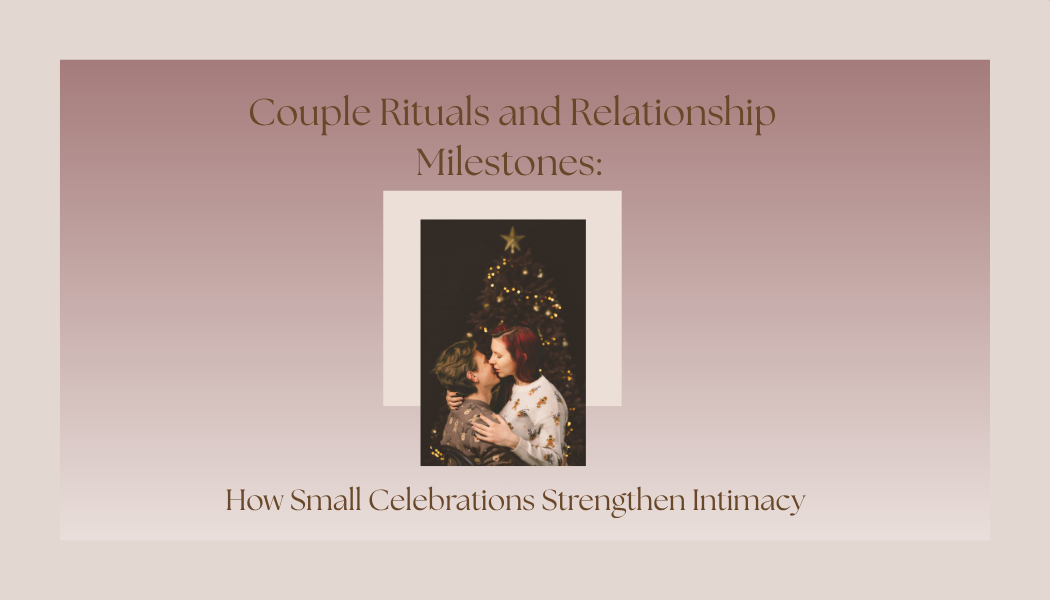Couple Rituals and Relationship Milestones: How Small Celebrations Strengthen Intimacy
Couple Rituals and Relationship Milestones:: How Small Celebrations Strengthen Intimacy
Discover how couple rituals, arbitrary milestones, and personalized celebrations build intimacy, strengthen emotional bonds, and nurture relationships. Learn how neuroscience explains why these shared markers matter for love and connection.
Why Do Relationship Rituals Matter?
Have you ever felt taken for granted in your relationship? Perhaps anniversaries or special occasions pass by unnoticed, leaving you longing for acknowledgment. Have you wondered, “Does my partner value the small moments we share as much as I do?”
In today’s world, couples are redefining what it means to celebrate their connection. Beyond traditional anniversaries or holidays, many are creating unique rituals and arbitrary milestones, sometimes called “arbitrary-versaries.” These might be monthly date nights, the day you first said “I love you,” or even rituals around coffee together every morning. Far from trivial, these practices play a profound role in building intimacy and reinforcing trust.
The Rise of Nontraditional Celebrations
Cultural expectations once dictated how and when couples celebrated their relationships, such as wedding anniversaries, Valentine’s Day, or milestone birthdays. But modern relationships often stretch beyond these conventions.
Couples today are marking:
— The anniversary of their first trip together
— The day they adopted a pet
— Monthly rituals, like cooking a new recipe or walking a favorite trail
— The “arbitrary-versary” of their first text exchange
These small but meaningful markers send a clear message: I notice you, I cherish us, and our story matters.
The Neuroscience of Rituals and Recognition
Why do rituals feel so powerful in relationships? Neuroscience offers answers.
— Dopamine and anticipation: Rituals create positive expectation. Planning a ritual releases dopamine, reinforcing motivation and pleasure.
— Oxytocin and bonding: Shared moments, especially those involving touch, laughter, or coordinated activity, release oxytocin, the “bonding hormone” that strengthens trust.
— Nervous system regulation: Rituals provide predictability. In times of stress, small celebrations or consistent markers signal safety to the nervous system, calming fight-or-flight responses.
When partners feel consistently acknowledged, their brains and bodies learn that the relationship is a secure place to rest, play, and grow.
The Painful Problem: Feeling Invisible in Love
It can feel devastating when you sense your partner has stopped noticing the little things that matter. Questions may arise:
— Why do I feel unseen in this relationship?
— Why do I care so much about rituals while my partner dismisses them?
— Am I asking for too much just to be acknowledged?
This lack of recognition often points to a deeper wound. Past experiences of neglect, trauma, or emotional abandonment may heighten the need for reassurance. When those needs go unmet, the nervous system reacts with anxiety, resentment, or shutdown.
Creating Relationship Rituals That Matter
1. Start Small
Rituals do not need to be grand. In fact, research shows it is the small, repeated acts that build lasting intimacy. A nightly check-in before bed or a ritual of saying goodbye in the morning can be just as meaningful as larger milestones.
2. Name the Milestone
Arbitrary milestones become powerful when they are named and honored. Mark the day you first held hands or the first time you overcame a conflict together. These “markers” weave your shared story into memory.
3. Use Rituals for Repair
After conflict, rituals of reconnection, like a walk, a cup of tea together, or a simple hand squeeze, help regulate the nervous system and rebuild safety.
4. Honor Individual and Shared Meaning
What feels important to you may not carry the same weight for your partner. Creating rituals together requires curiosity and a willingness to compromise. Ask: Which moments feel meaningful to you? How can we honor them in a way that feels authentic for both of us?
The Role of Therapy and Relational Healing
At Embodied Wellness and Recovery, we understand that rituals and milestones are not superficial; they are essential tools for nervous system regulation and relational repair. For couples struggling with trauma, intimacy issues, or cycles of disconnection, therapy can help by:
— Identifying unmet needs rooted in attachment and early experiences
— Teaching nervous system regulation skills to reduce reactivity in moments of disappointment
— Creating new relational rituals that restore connection and trust
— Strengthening communication so both partners feel seen and valued
Hope in the Everyday
The truth is, intimacy is not built on occasional grand gestures. It is cultivated in the micro-moments, the shared rituals, the remembered milestones, and the intentional choices to celebrate your bond. By creating rituals that honor your relationship, you send a powerful message: Our love is worth noticing, protecting, and celebrating.
A Pathway Back to Intimacy
Couple rituals, arbitrary milestones, and relationship markers are far more than quirky traditions. They are neuroscience-backed practices that calm the nervous system, strengthen bonds, and create relational safety. For couples who have felt invisible, unappreciated, or disconnected, these small celebrations offer a pathway back to intimacy, trust, and growth.
At Embodied Wellness and Recovery, we help couples reconnect with the small gestures that build lasting love and guide them toward the relational health they deserve.
Reach out to schedule a complimentary 20-minute consultation with our team of relationship experts, trauma specialists, or somatic practitioners, and start the process of cultivating deeper connection and intimacy.
📞 Call us at (310) 651-8458
📱 Text us at (310) 210-7934
📩 Email us at admin@embodiedwellnessandrecovery.com
🔗 Visit us at www.embodiedwellnessandrecovery.com
👉 Check us out on Instagram @embodied_wellness_and_recovery
🌍 Explore our offerings at Linktr.ee: https://linktr.ee/laurendummit
References
Gottman, J. M., & Silver, N. (2015). The seven principles for making marriage work: A practical guide from the country’s foremost relationship expert. Harmony Books.
Porges, S. W. (2011). The polyvagal theory: Neurophysiological foundations of emotions, attachment, communication, and self-regulation. W. W. Norton & Company.
Fiese, B. H. (2006). Family routines and rituals. Yale University Press.

